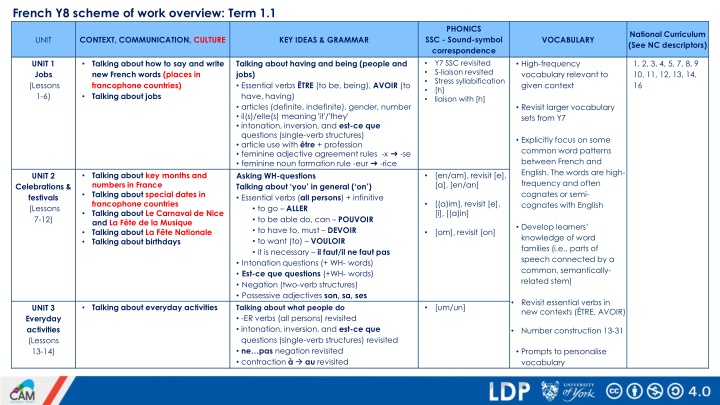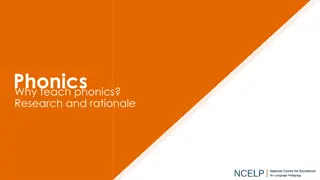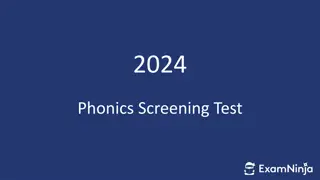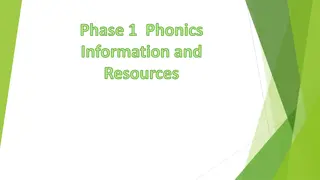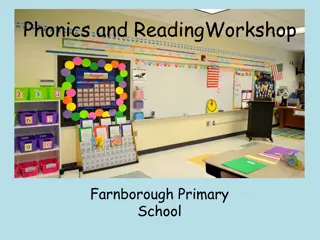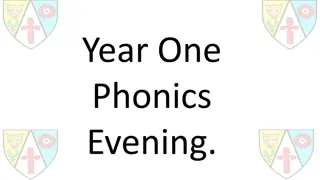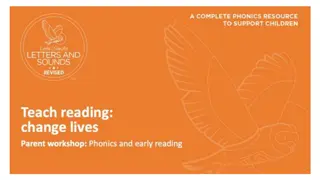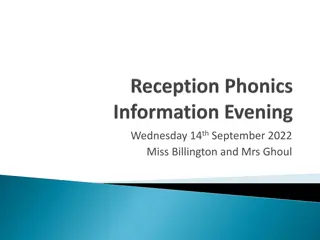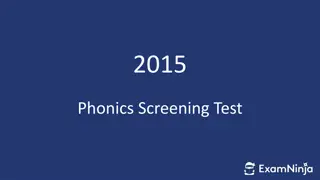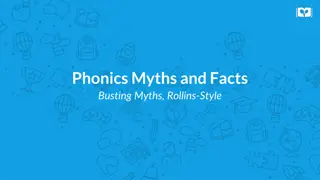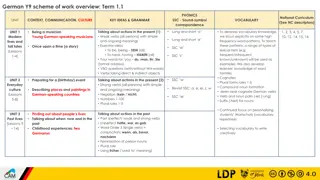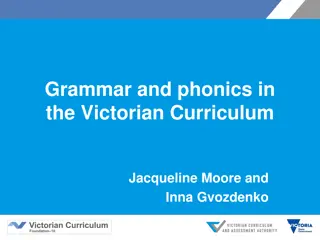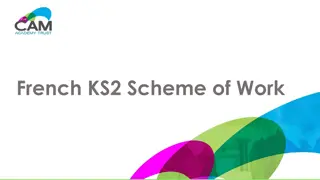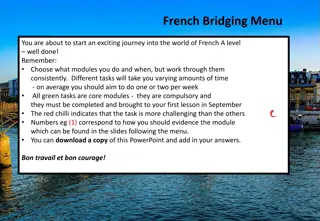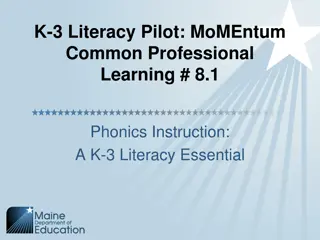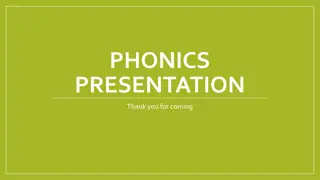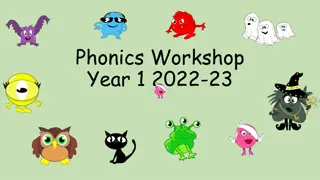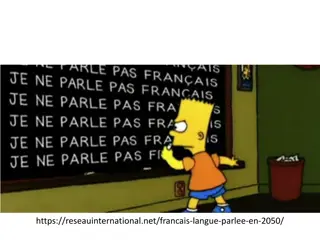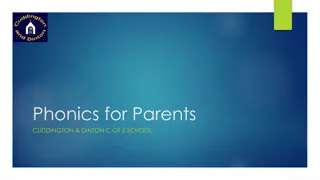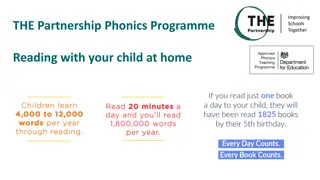French Y8 Scheme of Work Overview: Term 1 Phonics and Grammar
This scheme covers phonics, grammar, vocabulary, and key ideas for French Year 8 students focusing on topics like jobs, celebrations, festivals, and everyday activities. It includes essential verbs, word patterns, verb lexicon, past activities, and more to enhance language learning.
Download Presentation

Please find below an Image/Link to download the presentation.
The content on the website is provided AS IS for your information and personal use only. It may not be sold, licensed, or shared on other websites without obtaining consent from the author.If you encounter any issues during the download, it is possible that the publisher has removed the file from their server.
You are allowed to download the files provided on this website for personal or commercial use, subject to the condition that they are used lawfully. All files are the property of their respective owners.
The content on the website is provided AS IS for your information and personal use only. It may not be sold, licensed, or shared on other websites without obtaining consent from the author.
E N D
Presentation Transcript
French Y8 scheme of work overview: Term 1.1 PHONICS National Curriculum (See NC descriptors) SSC - Sound-symbol correspondence Y7 SSC revisited S-liaison revsited Stress syllabification [h] liaison with [h] UNIT CONTEXT, COMMUNICATION, CULTURE KEY IDEAS & GRAMMAR VOCABULARY UNIT 1 Jobs (Lessons 1-6) Talking about how to say and write new French words (places in francophone countries) Talking about jobs Talking about having and being (people and jobs) Essential verbs TRE (to be, being), AVOIR (to have, having) articles (definite, indefinite), gender, number il(s)/elle(s) meaning 'it'/'they' intonation, inversion, and est-ce que questions (single-verb structures) article use with tre + profession feminine adjective agreement rules -x -se feminine noun formation rule -eur -rice Asking WH-questions Talking about you in general ( on ) Essential verbs (all persons) + infinitive to go ALLER to be able do, can POUVOIR to have to, must DEVOIR to want (to) VOULOIR it is necessary il faut/il ne faut pas Intonation questions (+ WH- words) Est-ce que questions (+WH- words) Negation (two-verb structures) Possessive adjectives son, sa, ses Talking about what people do -ER verbs (all persons) revisited intonation, inversion, and est-ce que questions (single-verb structures) revisited ne pas negation revisited contraction au revisited High-frequency vocabulary relevant to given context 1, 2, 3, 4, 5, 7, 8, 9 10, 11, 12, 13, 14, 16 Revisit larger vocabulary sets from Y7 Explicitly focus on some common word patterns between French and English. The words are high- frequency and often cognates or semi- cognates with English Talking about key months and numbers in France Talking about special dates in francophone countries Talking about Le Carnaval de Nice and La F te de la Musique Talking about La F te Nationale Talking about birthdays [en/am], revisit [e], [a], [en/an] UNIT 2 Celebrations & festivals (Lessons 7-12) [(a)im], revisit [e], [i], [(a)in] Develop learners knowledge of word families (i.e., parts of speech connected by a common, semantically- related stem) [om], revisit [on] Revisit essential verbs in new contexts ( TRE, AVOIR) Talking about everyday activities [um/un] UNIT 3 Everyday activities (Lessons 13-14) Number construction 13-31 Prompts to personalise vocabulary
French Y8 scheme of work overview: Term 1.2 PHONICS CONTEXT, COMMUNICATION, CULTURE National Curriculum (See NC descriptors) SSC - Sound-symbol correspondence UNIT KEY IDEAS & GRAMMAR VOCABULARY [gn] [r] Building the verb lexicon Talking about past and present actions present vs perfect (with past simple equivalent in English) past participle formation: FAIRE, DIRE, -ER verbs (taking AVOIR ce, cet, cette, ces il y a vs il y avait intonation questions with question words and est-ce que questions (present vs perfect) (je, tu, il/elle) ne pas de negation (present vs perfect) UNIT 4 Past activities (Lessons 15 24) Talking about everyday routines (today vs yesterday) 1, 2, 3, 4, 5, 7, 8, 9 10, 11, 12, 13, 14, 16 Regular revisiting of Y7 vocabulary for consolidation open [(o)eu] Asking and answering questions about holidays (Belgium, Switzerland) revisit [eu] Words with multiple meanings are taught cumulatively closed [o/ ] revisit [(e)au] Text exploitation to extend vocabulary, aid recognition of cognates, and learners knowledge of word families Extended reading (Au r veillon de No l sur l ISS, la gastronomie fran aise au menu) open [o] Consolidation of question words and question formation UNIT 5 Free time activities (Lessons 25 28) Talking about what you do and where Using de prepositions taking de contraction au revisited, de du verbs with and de before nouns il y a vs il y avait intonation, inversion and est-ce que questions (present vs perfect) in single- verb structures partitive article de for parts and wholes partitive article de after FAIRE with sports quel, quelle, quels, quelles [-s-] [th] Talking about shopping for food and other activities
French Y8 scheme of work overview: Term 2.1 PHONICS National Curriculum (See NC descriptors) SSC - Sound-symbol correspondence [-ill|-ille] revisit [i] UNIT CONTEXT, COMMUNICATION, CULTURE KEY IDEAS & GRAMMAR VOCABULARY Building the verb lexicon UNIT 6 Talking about eating and drinking Using de Talking about when, where and how (using adverbs) Talking about past and present actions (revisited) de (du, de la, des, de l ) for uncountable nouns and unspecified quantities de/d in the negative and with expressions of quantity Essential verbs (singular): BOIRE; PRENDRE; SORTIR; VENIR adverb positioning Revisit adjective agreement and placement Revisit grammar from 7.3.2, 8.1.1, 8.1.2, 8.2.1 Saying you in formal and informal situations Essential verbs (plural persons) like: to go out, going out SORTIR to come, coming VENIR sans + infinitive vous meaning formal you on meaning people, you, one and new meaning we 1, 2, 3, 4, 5, 7, 8, 9 10, 11, 12, 13, 14, 16 Everyday life (Lessons 29 - 34) Regular revisiting of Y7 vocabulary for consolidation Talking and when, where and how [-ail|-aill] revisit [a] Talking about a typical day (last week or in general) revisit Y8 SSCs Prompts to personalise vocabulary Talking about what groups of people do [-eil|-eill] UNIT 7 A school exchange (Lessons 35 - 38) [-euil|-euill] [-ueil |-ueill], [- il| - ill] Talking in formal and informal situations [-ouil |-ouill] revisit [ | ], [ou], open [(o)eu] [oy] revisit [oi]
French Y8 scheme of work overview: Term 2.2 PHONICS National Curriculum (See NC descriptors) SSC - Sound-symbol correspondence [y] UNIT CONTEXT, COMMUNICATION, CULTURE KEY IDEAS & GRAMMAR VOCABULARY Building the verb lexicon UNIT 8 School life (Lessons 39 - 42) Talking about what you and others do at school Talking about present actions (with IR verbs like choisir) Essential verbs (all persons) like CHOISIR intonation, inversion and est-ce que questions (in single-verb structures) present with future meaning use of definite article with days of the week for habitual actions Describing more than one thing plural noun formation rules -au/-eu - aux/-eux and -al -aux plural adjective formation rules no change with -s or -x and -al -aux m me(s), autre(s), plusieurs positioning of multiple adjectives 1, 2, 3, 4, 5, 7, 8, 9 10, 11, 12, 13, 14, 16 [h] revisited Mixed word class sets of vocabulary Talking about what you are doing this week and what you do every week liaison/elision with [h] Regular revisiting of Y7 vocabulary for consolidation Talking about a day in the life of a journalist stress syllabification [2] UNIT 9 In the news (Lessons 43 - 46) Prompts to personalise vocabulary Describing things, people and events [em|am] revisited revisit [e] [a] [en|an] Describing a photo [em|am] and [en|an] before a vowel [(a)im] revisited Talking about a visit to a country or city (Paris) UNIT 10 Planning a trip (Lessons 47-48) Talking about intending, wanting, having and being able to do (revisiting) Essential verbs (singular persons) to go, going ALLER + infinitive to want (to) VOULOIR to be able to, can - POUVOIR to have to, must DEVOIR to know (how to) SAVOIR adverb placement, intonation and inversion questions, and ne...pas negation with 2-verb structures [(a)im] and [(a)in] before a vowel revisit [ai] [i] [(a)in]
French Y8 scheme of work overview: Term 3.1 PHONICS National Curriculum (See NC descriptors) SSC - Sound-symbol correspondence [om] revisit [on] UNIT CONTEXT, COMMUNICATION, CULTURE KEY IDEAS & GRAMMAR VOCABULARY Regular revisiting of Y7 vocabulary for consolidation UNIT 11 Comparing things and experiences (Lessons 49 - 54) Talking about being out with family Comparing with adjectives and adverbs Using RE verbs like prendre for present actions feminine adjective agreement rules -l - lle and -n -nne comparative forms of adjectives and adverbs using comparative structures Essential verbs (plural persons) like: to take, taking PRENDRE 1, 2, 3, 4, 5, 7, 8, 9 10, 11, 12, 13, 14, 16 Talking about family life [om] and [on] before a vowel Y8 vocabulary revisited throughout in different contexts Talking about pen friends [um|un] revisit [u] Developing the verb lexicon highly frequent (irregular verbs) in present and perfect, with verbs reused in different contexts. [um|un] before a vowel [r] revisited open [eu| u] revisited revisit [eu] UNIT 12 Talking about a visit to a pen friend in Spain Using RE verbs for present actions Essential verbs (singular) like: to understand, understanding ENTENDRE to read, reading LIRE to write, writing CRIRE tout, toute, tous, toutes Prompts to personalise vocabulary Communicating in other languages (Lessons 55 - 60) cont d in Term 3.2 Talking about a school trip to Italy [-il|-ill] revisited [-ien] revisited [-ueil |-ueill], [- il| - ill] revisited intonation questions with and without question words [-ouil |-ouill] revisited
French Y8 scheme of work overview: Term 3.2 PHONICS National Curriculum (See NC descriptors) SSC - Sound-symbol correspondence UNIT CONTEXT, COMMUNICATION, CULTURE KEY IDEAS & GRAMMAR VOCABULARY Extended reading to develop vocabulary depth, aid recognition of cognates, and learners knowledge of word families [y] revisited UNIT 12 cont d Communicating in other languages (Lessons 61 - 62) Describing language learning experiences Using RE verbs for present actions Essential verbs (plural) like: to read, reading LIRE to write, writing CRIRE Essential verb FAIRE with weather Inversion questions with and without question words 1, 2, 3, 4, 5, 7, 8, 9 10, 11, 12, 13, 14, 16 [oy] revisited Prompts to personalise vocabulary Talking about what groups of people do revisit Y7 and Y8 SSCs UNIT 13 Talking about the environment (Lessons 63 - 64) Using RE and IR verbs for present actions Essential verbs like: ENTENDRE, PRENDRE, LIRE, CRIRE, CHOISIR, SORTIR, VENIR (revisited) Adjective agreement and placement (revisited) Comparative structures with adjectives and adverbs (revisited) Asking inversion questions in the past (perfect) tense Talking and asking about what you did and have done present vs perfect (with past simple and present perfect equivalent in English) intonation, inversion and est-ce que questions (perfect) (did? vs have/has done?) specified vs unspecified times in the past adverb placement (present vs perfect) past participle formation: verbs like prendre, dit, fait, bu, eu Talking in formal and informal situations UNIT 14 Past events (Lessons 65 72) Talking about Ast rix et Ob lix [-s-] revisited [ |soft c] revisited [-tion] revisited [th] [qu] [ch] revisited [-gn-] revisited [j|soft g] revisited closed [o| ] revisited open [o] [(e)au] revisited Talking about a work experience placement Talking about the school holidays Talking about an accident
KS3 Languages National Curriculum and Knowledge strands matrix National Curriculum objectives Pupils should be taught to: NC no. Knowledge Strands Listening, Reading, Speaking, Writing Recognition & Production (Sound to print L & W) Recognition & Production (Print to sound R & S) transcribe words and short sentences that they hear with increasing accuracy. 1 Phonics speak coherently and confidently, with increasingly accurate pronunciation and intonation. 2 3 4 listen to a variety of forms of spoken language to obtain information and respond appropriately. read and show comprehension of original and adapted materials from a range of different sources, understanding the purpose, important ideas and details, and provide an accurate English translation of short, suitable material. read literary texts in the language [such as stories, songs, poems and letters], to stimulate ideas, develop creative expression and expand understanding of the language and culture. initiate and develop conversations, coping with unfamiliar language and unexpected responses, making use of important social conventions such as formal modes of address develop and use a wide-ranging and deepening vocabulary that goes beyond their immediate needs and interests, allowing them to give and justify opinions and take part in discussion about wider issues identify and use tenses or other structures which convey the present, past, and future as appropriate to the language being studied. use and manipulate a variety of key grammatical structures and patterns, including voices and moods, as appropriate. Understanding (Aural (L) / Written (R)) Vocabulary 5 6 7 Production 8 (Oral (S) / Written (W)) 9 Understanding (Aural (L) / Written (R)) 10 11 identify and use tenses or other structures which convey the present, past, and future as appropriate to the language being studied. use and manipulate a variety of key grammatical structures and patterns, including voices and moods, as appropriate. express and develop ideas clearly and with increasing accuracy, both orally and in writing use accurate grammar, spelling and punctuation. write prose using an increasingly wide range of grammar and vocabulary, write creatively to express their own ideas and opinions, and translate short written text accurately into the foreign language. Grammar 12 Production 13 (Oral (S) / Written (W)) 14 15 16
